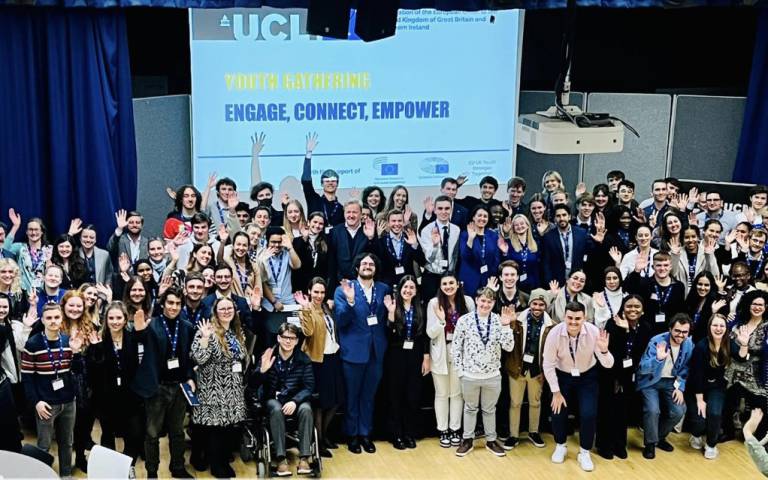UCL European Institute and the Delegation of the European Union to the UK this week brought together more than 120 students to discuss the primary challenges facing today's young people and share perspectives on EU-UK relations.

The inaugural EUDEL Youth Gathering also marked the launch of a network of EU Affairs Societies across UK Universities, coordinated by UCL's European and International Social and Political Studies student society (UCL EISPS).
A range of exceptional UCL young leaders took part in the event, including Blanche Girard and Ioana Turcan, respective President and Chair of UCL EISPS society, Manaal Tariq, International Students' Officer at UCL Students' Union, and Freya Proudman, UCL School of Slavonic & East European Studies PhD student and former EU Youth Ambassador.
UCL President & Provost Dr Michael Spence joined EU Ambassador Pedro Serrano to welcome participants to the event, underlining the importance of youth dialogue across sectors and across borders, and emphasising UCL's longstanding connections to Europe.
The Youth Gathering aimed to facilitate meaningful policy dialogue with young people from across the UK, with participants from diverse backgrounds representing a range of sectors and organisations.
In his opening remarks, Pedro Serrano said: "The EU is engaging with young people to find innovative answers to global challenges. Never before has youth been so well informed and interconnected. This comes with responsibilities. It also brings an obligation to the older generations to develop sustainable communities that respects your aspirations. The European Union and the United Kingdom share resources, interests and values. Our relationship is now being built on a new framework. Your ideas and commitment are crucial in shaping our common future."
Participants worked in groups to discuss a range of topics, including sharing how they would like to see relations develop between the UK and EU in future, and to learn more about youth engagement opportunities in the EU.
Dr Uta Staiger, Executive Director of the UCL European Institute and UCL's Global Strategic Academic Advisor (Europe) was among hosts welcoming delegates and overseeing break-out sessions.
During the conference, UCL EISPS Student Society President, Blanche Girard, co-chaired the first ever meeting of the national network of EU student societies. The preparatory meeting for the network was hosted by UCL's European Institute in June 2023, when 50 representatives from established or emerging European student societies at 22 universities across the UK visited Bentham House.
Professor Geraint Rees, UCL Vice-Provost (Research, Innovation and Global Engagement) joined Nicole Mannion, Deputy EU Ambassador, at the Youth Gathering's closing session to thank participants for their contributions.
Professor Rees said: "At UCL we are proud of our rich European links. Nine per cent of our student body and 20% of our staff are EU nationals, and we believe that makes us stronger and more successful academically, and as a community.
"We have a strong track record of collaborating with partners across Europe to pursue ground-breaking research in areas from the low-carbon energy transition to the responsible regulation of AI. We enjoy strong partnerships - spanning research and student mobility - with institutions across the continent, from KU Leuven to Sciences Po and Max-Planck.
"Maintaining close relationships and mutual understanding between students and young people in Europe and the UK is fundamental to building a strong foundation for EU-UK relations into the 21st century."
UCL and European researchers regularly collaborate to deliver ground-breaking research that benefits society. Over the past five years, UCL-European research partnerships generated more than 34,000 co-publications. UCL was also the fourth most successful higher education institution in securing EU research funding under Horizon 2020.
The Youth Gathering was co-organised by the Delegation of the European Union to the United Kingdom and UCL European Institute, with the support of the European Economic and Social Committee, the European Parliament Liaison Office, the British Council's Stronger Together project and UCL EISPS.






